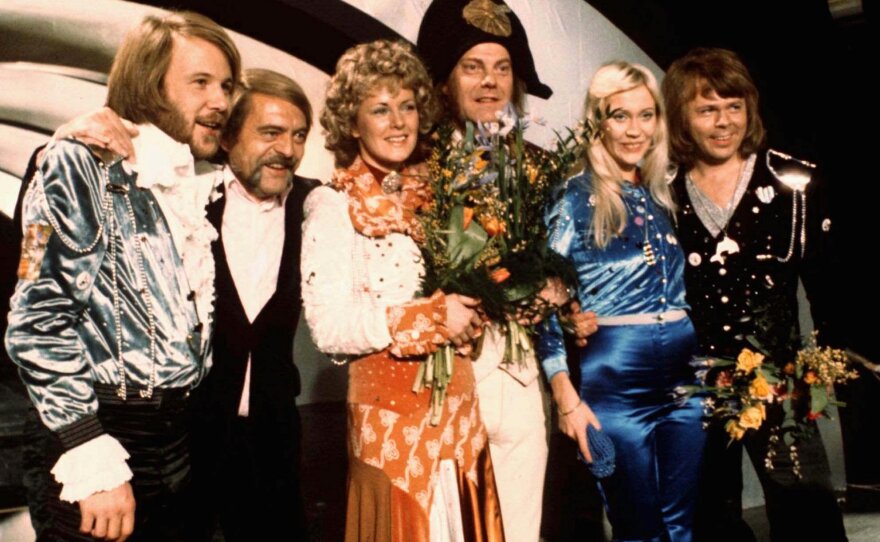Ukraine's Eurovision Song Contest win earlier this summer was a triumph for the war-torn country, with its folk-rap group Kalush Orchestra taking first place and shining a spotlight on Ukrainian culture.
It also posed a logistical challenge: How, if at all, might Ukraine be able to plan and produce next year's contest — as is customary for first-place winners — while defending itself against Russia's invasion?
A panel of public broadcasters and security experts concluded last month that it won't be feasible for Ukraine to host the famously elaborate TV event — which requires 12 months of preparation involving thousands of people, and has historically generated millions of dollars in tourism revenue — given the security issues posed by Russia's war.
Instead, the United Kingdom will host Eurovision 2023 on Ukraine's behalf, officials announced on Monday. The BBC will take over hosting duties and work with representatives of Ukraine's public broadcaster, UA:PBC, to incorporate Ukrainian elements into the production.
Mykola Chernotytskyi, the head of UA:PBC's managing board, said in a statement that "the 2023 Eurovision Song Contest will not be in Ukraine but in support of Ukraine."
"I am confident that together we will be able to add Ukrainian spirit to this event and once again unite the whole of Europe around our common values of peace, support, celebrating diversity and talent," he added.
The European Broadcasting Union (EBU), which operates Eurovision, announced in June that a feasibility study had determined Ukraine's broadcaster could not meet "the security and operational guarantees required for a broadcaster to host, organize and produce the Eurovision Song Contest."
EBU officials delivered their assessment with what they called "deep regret" — and it wasn't well-received in Ukraine, either. Kalush Orchestra frontman Oleh Psiuh, Ukraine's culture minister and two previous Eurovision winners signed a letter disagreeing with the decision and demanding additional negotiations, arguing that Ukraine would be able to fulfill its commitments after all.
"We honestly won Eurovision and have fulfilled all the conditions within the deadlines for the process of approving its holding in Ukraine," they wrote. "We have provided answers and guarantees on safety standards and possible venues for the competition."
Ukraine's broadcaster expressed similar sentiments in a separate statement, saying "a large number of people in Ukraine have thrown all their efforts" into making it possible for the country to safely host — including proposing several venue options in the regions of Kyiv, Lviv and Zakarpattia (on the border with Hungary and Slovakia).

The EBU has emphasized that Ukraine will be celebrated and represented regardless of where the 2023 competition takes place. The broadcasting organization first approached the U.K. as a potential host, as British singer Sam Ryder was this year's runner-up.
This is not the first time that the BBC will take on hosting duties for other winning countries. Martin Österdahl, the contest's executive supervisor, said it has done so on four previous occasions.
The U.K. stepped in to host in 1960, 1963, 1972 and 1974 despite not having placed first in the previous year's contest, according to Eurovision's website. Other non-winning countries have hosted the competition over the years, including Germany, Spain, Amsterdam and Scotland.
"Continuing in this tradition of solidarity, we know that next year's Contest will showcase the creativity and skill of one of Europe's most experienced public broadcasters whilst ensuring this year's winners, Ukraine, are celebrated and represented throughout the event," Österdahl added.
As the most recent winner, Ukraine will automatically qualify for the Grand Final along with the usual "Big 5" counties that contribute the most financially: France, Germany, Italy, Spain and the U.K.
The exact host city has yet to be determined, since that's the result of a monthslong bidding process that officials say will launch this week. They expect bidding to be competitive, noting that local officials from more than a dozen cities (from Belfast to Glasgow to Wolverhampton) have already expressed interest in applying.
Cities vying for the host title must demonstrate that they can meet a list of expectations, the EBU says. Criteria for last year's host city — which was ultimately Turin, Italy — included being able to provide a venue that could accommodate at least 10,000 spectators and be within easy reach of an international airport.
British Prime Minister Boris Johnson tweeted on Monday that he had spoken with Ukrainian President Volodymyr Zelenskyy last week, and agreed that "wherever Eurovision 2023 is held, it must celebrate the country and people of Ukraine."
"As we are now hosts, the UK will honour that pledge directly – and put on a fantastic contest on behalf of our Ukrainian friends," added Johnson. He himself will most likely not be at the country's helm when the competition finally arrives, having announced earlier this month that he will resign after his party chooses a new leader (two finalists are set to campaign to members before a vote in early September).
Audiences will have to stay tuned for the contest's exact dates (the final is usually in May, but days vary) as well as its updated logo, which organizers say will reflect "the unique staging of next year's Contest and the cooperation between the host country and this year's winners."
The BBC has held Eurovision more times than any other country's broadcaster, according to organizers: It hosted in London in 1960, 1963, 1968 and 1977; Edinburgh in 1972; Brighton in 1974; Harrogate in 1982 and — most recently — Birmingham in 1998.
Copyright 2022 NPR. To see more, visit https://www.npr.org. 9(MDAzMjM2NDYzMDEyMzc1Njk5NjAxNzY3OQ001))






